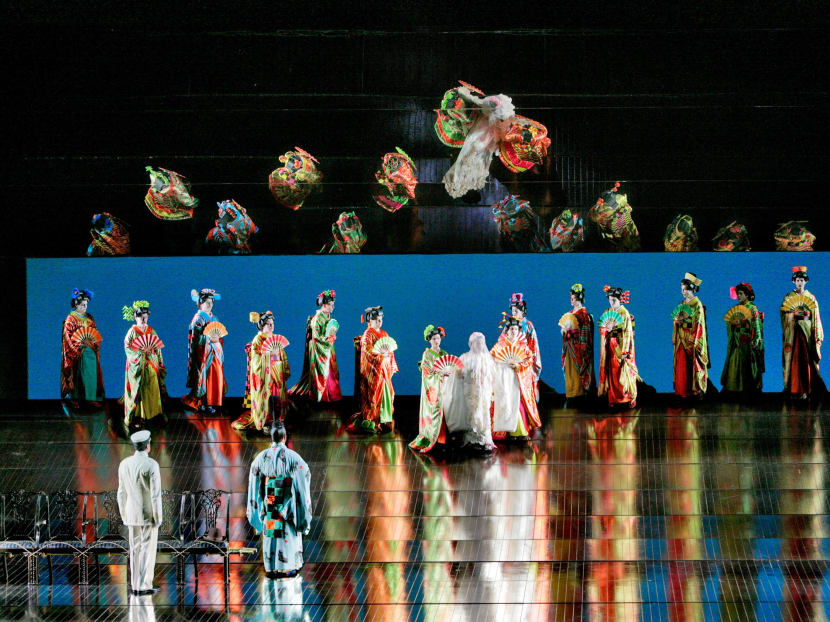Opera’s opening night
LONDON — What should your first opera be?

Madama Butterfly is a titillating tale of devotion told to music. Photo: Bloomberg
LONDON — What should your first opera be?
Yes, that’s a pretty strange question. No one ever asks: “What should your first movie be?” Anything from Bambi to Star Wars to The Lego Movie would do, and whatever your response, no one would ever claim that his first film had either converted him completely to cinema or put him off it for life. Likewise books. Or television. Or pretty much any other art form. The very question itself is part of opera’s image problem.
Another is the false perception of its essential disengagement from the real world. When you enter any theatre, you’re passing through portals into another world of heightened sensuality and surreally enhanced emotions. Or at least you should be, if the performance you are seeing is any good. And that’s where, as an art form, opera’s true engagement with the world is to be found: In heightening the love stories, myths, tragedies and comedies of human existence, opera is more real than real life. In its potential for expressive intensity, excessive emotional impact — its direct human engagement, in other words — there really is nothing to compete with what opera can make you feel.
The trick is to get there in the first place, which returns me to the initial question: Which opera should you see if you’ve never been before?
Probably the most important thing to remember is that no single opera can hope to sum up the whole art form.
If you’re bored to the point of chewing off your limbs sitting through Wagner’s Parsifal rather than Puccini’s La Boheme (or the other way round), don’t despair. You’re in good company if you can’t get on with Wagner and/or Verdi, or if you find Handel just a trifle tedious, or think Berg is just too violently excessive and excessively violent. In fact, the great opera composers aren’t really engaged in the same art form at all: A Handel opera is as different from a Wagnerian music-drama as a pop-up book is from a 3D movie (nothing pejorative there; you could make a case for either metaphor for working for both composers).
However, there will be something out there in the operatic canon that takes you into that magical, hyper-real place.
Nonetheless, you can give yourself more of a chance if you identify with the following operatic characteristics: If you’re an artistic adrenaline junkie, the composer you have to hear is Janacek, whose operas cram all of the intensity and storytelling of much longer operas into music that’s shorter than your average Hollywood release. Try the tragedy of Katya Kabanova, the laceratingly moving The Makropulos Case or the earthy anthropomorphism of The Cunning Little Vixen. All of those pieces have the potential to change what you thought about opera, since they’re compact, their energy never flags and they’re completely compelling stories.
And if you enjoy Janacek, you have to hear the joyous, transcendent chaos and intensity of Irish composer Gerald Barry’s operas, like his The Importance Of Being Earnest.
Often it’s the cosseting accoutrements of the operatic experience that are off-putting, which is where contemporary opera has much of its power, since many new operas speak a language that cuts through centuries-old operatic conventions.
If that sounds like what you want, try and hear or see Harrison Birtwistle’s operas or smaller-scale music theatre works, such as Gawain or Yan Tan Tethera; get along to the production of Julian Anderson’s Thebans; listen to George Benjamin’s eviscerating Written On Skin; or hear Thomas Ades’ magical The Tempest.
But for more conventional introductions to the world of opera, Verdi’s Otello is one of the most thrilling stories ever told in music, as is his La Traviata or Falstaff.
Then there’s Puccini — Tosca! Turandot! Madama Butterfly! And Wagner: Why not plunge straight in at the deep end and experience The Ring cycle? It was written to change the world, after all, so it should change yours, and there’s no more arresting opening or ending to any operatic drama than the start of Das Rheingold or the climax of Gotterdammerung. And the 15 hours in between aren’t bad either.
And then there’s Britten; the outsider drama of Peter Grimes, the ghost story of The Turn Of The Screw, the sea-lashed but claustrophobic drama of Billy Budd. You see? And that’s merely a scratching of the operatic surface; we haven’t even mentioned Monteverdi, without whom none of the above could have happened.
Opera is the hardest art form in the world to pull off, with its multi-dimensions of music, sets, lighting, stage management — and a bit of singing too. AGENCIES





